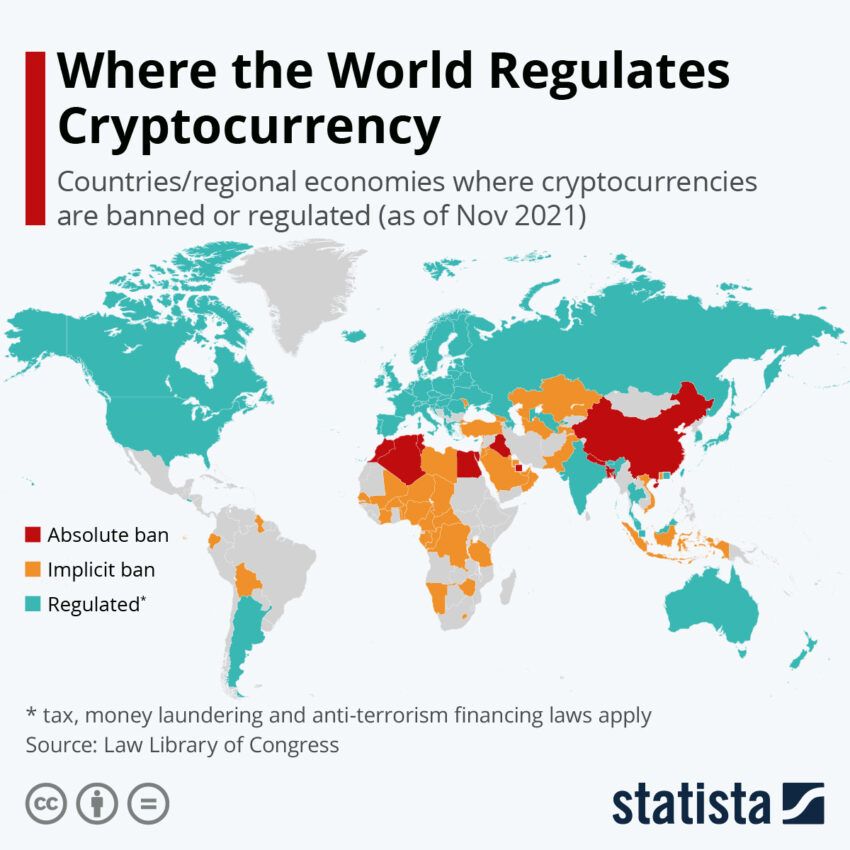Dealing with an uncertain regulatory environment is perhaps the biggest challenge facing web3 recruiters today. Legal clarity and assurances are still lacking, even within some of the biggest economies and innovation hubs. For instance, in the U.S., web3 founders must contend with a dynamic set of regulations that can apply in different ways based on various changing factors.
The bottom line is that web3 innovation is moving faster than regulation, which is often the case with most tech innovations. With this in mind, it’s crucial for web3 recruiters to be well-informed about the legal and regulatory issues facing the industry and to develop hiring policies that reflect these challenges. This guide aims to help you start that process, highlighting the biggest regulatory challenges facing web3 recruiters.
Top regulatory challenges in web3 hiring
The issue of web3 regulation, or the lack thereof, is intertwined with the regulatory uncertainties surrounding cryptocurrencies. Crypto is generally considered to be the backbone of the web3 ecosystem. So, any regulations placed on cryptocurrencies will inevitably impact web3 projects that rely on them. For example, stricter KYC/AML rules for crypto exchanges could make it more difficult for web3 platforms to onboard users.

Let’s explore some of the biggest challenges recruiters face when hiring in web3.
“In web3 today, there are more job offers than good candidates, but talent remains the most scarce resource.”
– Anthony Avedissian: @antavedissian on X
KYC verification for web3 hiring
KYC, or Know Your Customer, is important in confirming identities, a vital process for web3 companies engaging with global contractors and employees. In web3, where hiring platforms frequently operate online and seldom involve face-to-face meetings, verifying the true identities of prospective team members becomes a critical task.
This challenge is even more pronounced for web3-native organizations like DAOs. That’s because such organizations often prioritize the privacy and anonymity of their contributors. To reconcile the need for anonymity with the demand for regulatory adherence, these organizations require innovative systems.
Ideally, such a system should be designed to perform KYC verifications while respecting individuals’ anonymity. This delicate balance is essential in ensuring both compliance with international hiring regulations and maintaining the core values of privacy and decentralization that are fundamental to the ethos of web3.
Payroll and compliance obstacles
Crypto salaries are popular among web3 employees, especially in cross-border payment scenarios. Compared to traditional options like wire transfers and PayPal, cryptocurrency offers faster settlement and lower transaction fees. Given the global, decentralized nature of web3, these efficiency benefits likely explain the traction of crypto payroll within the community.
That said, cryptocurrency laws vary dramatically across borders, creating payroll complexities for international companies. To address these challenges, some solutions involve using payroll services to convert crypto payments into fiat.
This approach helps companies bypass geographical limitations and restrictions. This, in turn, enables them to offer flexible and compliant salary options to their employees regardless of their location. Organizations can use these adaptive payroll techniques to cater to the diverse preferences of their workforce. All while reconciling disparate regulations worldwide.
For more insights, check out our detailed guide on crypto payrolls.
Compliance with anti-money laundering regulations
Anti-money laundering compliance brings unique challenges in web3 due to its decentralized ethos. The growing concerns stemming from cryptocurrency-based money laundering — via both centralized and decentralized platforms — underline the need for stringent due diligence. As a web3 employer, you need to take extra precautions by keeping a close eye on transactions and raising the alarm quickly if something seems off.
However, traditional regulatory frameworks still struggle to find their footing in web3. Therefore, businesses need to walk the extra mile to proactively avoid enabling illegal transactions. Ideally, as a web3 organization, you should emphasize the need for a sophisticated system to track and analyze transaction patterns for oddities. Additionally, you have to conduct thorough background checks and maintain detailed records of all incoming and outgoing transactions.
The dilemma, however, is once again upholding privacy and decentralization — both core web3 principles. Solutions that respect user anonymity while still combating financial crimes demand nuance. Perhaps a balanced starting point would be to adapt existing AML strategies and then finetune them to match the realities of web3’s decentralized nature.
The issue of jurisdiction in web3 hiring
Like the internet today, web3 will likely not fall under any single regulator’s total control. The U.S. has been slow in overseeing tech giants and the two most critical web3 building blocks — crypto and blockchain.

Also, web3, by design, intends to be a decentralized system that deliberately limits governmental control. Thus, without major policy shifts, no one entity will hold full power in shaping the future internet. This situation may seem to enable a more balanced system. However, tech firms could still wield significant influence through their hefty web3 investments, potentially dominating the next internet phase in the absence of adequate regulations.
Interestingly, certain regulations might even empower big techs. For instance, the sustainability-driven transition from proof-of-work to proof-of-stake cryptocurrencies could give those investing most the greatest sway in recording blockchain histories.
With no unitary oversight, web3 recruiters now face a complex and rapidly changing environment. Staying current on technological shifts — for example, cryptocurrencies transitioning PoW to PoS — will be crucial. As a web3 recruiter, you must have a good grasp of how these changes influence the skills and expertise required in the industry.
The involvement of international institutions like the World Bank and the IMF adds another layer of complexity. Recruiters should be aware of how these organizations’ positions on cryptocurrencies and environmental concerns might shape the future of web3. This awareness is crucial for identifying candidates who are prepared for a web3 world that balances innovation with regulatory and environmental considerations.
Possibility of a regulatory crackdown
The prospect of regulatory crackdowns casts a shadow over web3 and crypto. The lack of clear regulatory oversight guardrails makes the industry vulnerable to sudden policy shifts in unfavorable directions.
This uncertainty breeds apprehension, discouraging both skilled professionals and cautious investors from tapping into web3’s potential.
Consider a scenario wherein regulators, alarmed by financial stability or illegal activity fears, unleash a wave of stringent web3 rules. Overnight, the once-thriving web3 startups could be deemed shady, which could then force drastic shutdowns.

Such a disruptive event could then trigger a talent exodus as web3 employees and recruiters flee to more established industries’ safe harbors. The aftermath could severely impact talent acquisition. Struggling companies would likely slash recruitment budgets amid regulatory fallout, leaving even exceptional web3 talent scrambling. The hiring scene would shrink dramatically, sidelining critical skills and obstructing innovation possibilities.
While improbable at this juncture, this chilling scenario can not be ruled out entirely. The best way to address this fear would be to engage policymakers in open dialogue while simultaneously promoting responsible growth within the industry.
What do these challenges mean for the future of web3 hiring?
As the web3 sector evolves and grows, the negative side effects of the lack of adequate regulations are becoming more and more evident. Regulators and policymakers are scrambling to address the issue, albeit not as fast as you would hope for. One idea is to look to international institutions for setting standards. However, it seems none of the relevant institutions are ready yet to take a strong stance on the issue. And that brings us back to square one, pushing the responsibility back to national authorities.
Considering these factors, it’s not enough to focus on innovation only. Rather, web3 businesses need to become bastions of responsible conduct, prioritizing the safety and security of their global workforce and community. For instance, when you have a developer in Berlin, a moderator in Manila, and an artist in Mumbai – all vital cogs in the web3 machine — each of them deserves protection. It’s about ensuring their compensation, whether on-chain or off, meets every regulatory hurdle across every border. So, to cut the long story short — in web3 hiring, compliance isn’t a drag; it’s a passport to legitimacy.
Frequently asked questions
What are the main challenges of regulatory compliance in web3 hiring?
How does the decentralized nature of web3 complicate regulatory oversight?
What role do tech companies play in the regulatory framework of web3?
Disclaimer
In line with the Trust Project guidelines, the educational content on this website is offered in good faith and for general information purposes only. BeInCrypto prioritizes providing high-quality information, taking the time to research and create informative content for readers. While partners may reward the company with commissions for placements in articles, these commissions do not influence the unbiased, honest, and helpful content creation process. Any action taken by the reader based on this information is strictly at their own risk. Please note that our Terms and Conditions, Privacy Policy, and Disclaimers have been updated.




